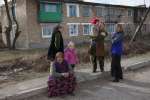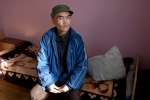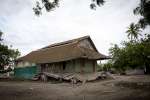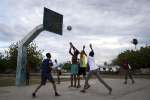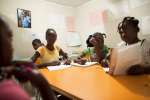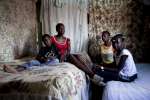- Text size
 |
|  |
|  |
| 
- عربي
Stateless in the Philippines: Indonesian descendants feel torn between two lands
News Stories, 15 September 2014
KIDAPAWAN, Philippines, September 15 (UNHCR) – The question is simple: "Where are you from?" But in this rice-milling community in southern Mindanao, the answers are never straightforward.
"My parents are from Indonesia. My mother escaped forced marriage and came to the Philippines. My father came to work. I was born in the Philippines," said Merlyn Mandak, a 48-year-old who lives in a mixed community alongside Filipinos in Kidapawan, Cotabato province.
"It's better to be a bird because at least they have their own nest," said her neighbour Roger Mandak (no relation), 58, lamenting the struggles faced since his parents came to the Philippines in the 1930s. Roger and Merlyn are people of Indonesian descent. Their ancestors moved here generations ago and left a legacy no one wants or deserves – statelessness.
Under the country's 1958 Citizenship Law, Indonesians would lose their citizenship if they lived abroad for more than five years without registering with the Indonesian authorities.
In 2006, the government reformed its citizenship law to make sure that statelessness would no longer occur in this way and to offer those who had lost Indonesian nationality a way to reacquire it. However, some people did not formally reacquire Indonesian citizenship and remain stateless, with neither Indonesia nor the Philippines currently treating them as nationals.
A mapping study conducted by UNHCR and the governments of Indonesia and the Philippines in 2012 and 2013 identified more than 6,000 people of Indonesian descent who were of undetermined nationality in the southern Philippines. Those interviewed highlighted daily challenges such as poor access to employment, livelihoods, education and clean water. They also face immigration penalties linked to the fact that neither Indonesia nor the Philippines recognizes them as citizens, and due to their lack of a secure immigration status.
"Given the uncertainty of their status, they suffer discriminatory treatment in employment because they are considered as aliens by most people. There is a threat they would be deported, especially if they do not comply with our labour laws," said Precious Pojas, senior state counsel at the Ministry of Justice, adding that their rights to land ownership could also be denied.
At a glance, Merlyn seems luckier than most. Her husband Joseph, also of Indonesian descent, works illegally in a rice mill in Kidapawan. His employer provides free accommodation and utilities. Their youngest daughter, aged 13, attends a nearby school. Two older daughters have married Filipinos.
But like their local neighbours, they struggle with poverty. Joseph's income fluctuates and Merlyn's uncertain status prevents her from seeking legal work outside the community. They live from hand to mouth, losing sleep when the bills and school fees come all at the same time.
Things get even more complicated in the first two months of every year, when they have to pay an annual reporting fee for their alien certificates of registration. While the cost of renewal is not high, getting to the renewal site often takes hours and several thousand pesos in transport costs. The fine for late renewal accumulates every month, putting some families in debt.
Recognizing the community's livelihood problems, UNHCR has teamed up with the local authorities and an NGO called Pasali to help supplement their income. Through the People's Organization, a cooperative involving representatives from this community, it was decided that they would start a mushroom farming project. The local authorities provide the land and transport, UNHCR provides the spores while Pasali trains members on how to grow mushrooms with banana leaves.
Merlyn, who was elected as the chair of the People's Organization, hopes that they can soon grow enough mushrooms to exceed their 3,000-peso (US$70) sales to date. "We hope to have abundant harvest every day, it will really help us with our daily needs." But livelihoods alone will not solve their problems.
Following on the mapping exercise, the governments of Indonesia and the Philippines have agreed to work together to verify the nationality of people of Indonesian descent in Mindanao. This will involve setting up procedures to determine their citizenship status – if they are Indonesian or Filipino or without any nationality – and to address the protection issues they face.
"Once they have the status [of citizens], it will be much easier for the governments to give them protection and access to social services like education, health care," said Agung Sampurno at the Indonesian consular office in Davao City. "The essence of this cooperation is to give them the right to have a better life, not only for them but also for their children, grandchildren and great grandchildren."
The vice consul added that once the problem was resolved in Mindanao, the same approach would be used to address the similar problems faced by people of Filipino descent now living on Indonesian islands in the Sulu Sea.
"We are facilitating the discussion between the two governments on the different options available for these people," said Rico Salcedo, UNHCR's legal officer in Manila. "The cooperation has been exceptional and we believe it's a model that other states can replicate in terms of what has been adopted in the process and the way it has been done."
Asked where she sees her future, Merlyn replied, "We can't throw away our Indonesian identity, it's who we are. But I don't want to go back, I have no relatives and don't know the language. The Philippines is home."
By Vivian Tan in Kidapawan, the Philippines















